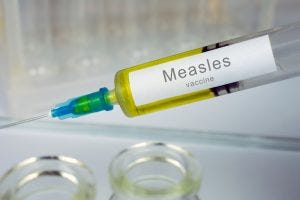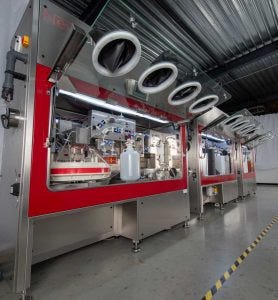Content Spotlight
Podcast: MilliporeSigma says education vital to creating unbreakable chain for sustainability
MilliporeSigma discusses the importance of people, education, and the benefits of embracing discomfort to bolster sustainability efforts.

Univercells aims to make affordable measles and rubella vaccines using its NevoLine biomanufacturing platform incorporating the scale-X fixed-bed bioreactor.
In a consortium with Batavia Biosciences and Natrix Separations, Belgium-based Univercells has been able to develop a manufacturing platform that has slashed the cost of production of inactivated polio vaccine (sIPV).
Now, through a $14.3 million (€12.8 million) from the Bill & Melinda Gates Foundation, the firm is looking to adapt the platform to produce low-cost measles and rubella (M&R) vaccines for use in in low- and middle-income countries (LMICs).

Image: iStock/Roman Didkivskyi
“Our collaboration with consortium partner Batavia Biosciences will lead to the development and optimization of the entire production processes of measles and rubella vaccines, with the objective to drastically reduce production costs,” Univercells spokesperson Marie Jourdan told Bioprocess Insider.
“This grant will also help explore novel vaccine delivery technologies to facilitate administration of the measles and rubella vaccines. To this end, Univercells will work on optimizing the process to deliver a highly concentrated product, a requirement for these novel delivery technologies.”
The project will revolve around Univercell’s NevoLine biomanufacturing platform, a low-footprint production unit used for viral products such as vaccines and gene therapy vectors. The technology, proven in the sIPV program, is flexible enough to be adapted to be used to manufacture GMP material of measles and rubella to initiate clinical validation, Jourdan told us.
“At the core of the NevoLine platform lies the scale-X fixed-bed bioreactor, delivering high cell densities and virus yields while enabling drastic footprint reduction,” she said.

The NevoLine manufacturing platform. Image c/o Univercells
The single-use, automated bioreactor systems allows intensified cell culture and viral production from pilot to large scale industrial manufacturing, the firm claims, and has demonstrated proof-of-concept in the transfer of HEK293 cells for adenovirus production from static plastic to scale-X hydro bioreactor (2.4 m²).
“Following the first application for sIPV, this grant will first focus on optimizing measles and rubella production with this scale-X bioreactor, making use of a different cell line MRC-5. This scale-X bioreactor will be integrated with downstream technologies to deliver a total end-to-end process solution.”
The platform can offer low-cost, large-scale production due to lower capital expenditures and consequently lower fixed costs, she continued, adding: “Automation and integration of the platform lead to process simplification, reducing utilities consumption and manual operations, enabling drastic reduction of Costs of Goods.”
Almost 90% of the vaccine revenue market is split between four companies: GSK, Merck & Co., Sanofi Pasteur and Pfizer, according to data from Statista. With vaccines viewed as “the backwaters of the pharma industry,” we asked Jourdan where Univercells stands in the space,
“Univercells does not necessarily mean to compete with large pharmaceutical companies but rather to position our offering in competitive whitespaces, where the cost structure of traditional players would not be sustainable with required pricing (e.g. UNICEF tenders),” she said. “UNICEF and other tender prices will even decrease in the upcoming years, leading pharma companies to move away from that business.”
She continued: “As a result, we notice a series of global health vaccines currently suffering from a structural supply gap,” citing supply of Yellow Fever vaccine to Africa being four to 14% below the UNICEF demand on the period 2017-2021, as an example.
“Univercells biomanufacturing solutions will aim at significantly increasing the capacity of these vaccines to fill the gaps, offering a sustainable solution for their cost-effective production.
“We believe the NevoLine manufacturing platform could prove beneficial for large pharma companies as well, for instance to revamp legacy portfolios or to develop and market new vaccines based on cost-effective processes.”
You May Also Like